HREC/CIUS Publications
HREC maintains an active publishing program, with a focus on the publication of proceedings based on our conferences. Please also see our publication The Holodomor Reader, available here online.
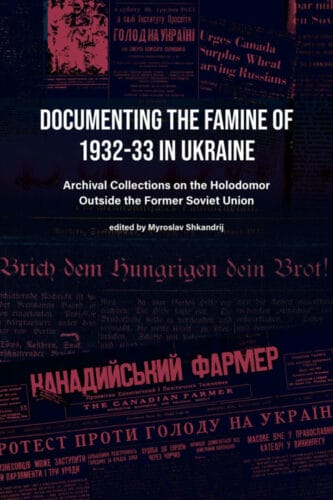
Documenting the Famine of 1932–33 in Ukraine
This collection of articles breaks new ground in Holodomor scholarship, presenting archival sources that in many cases are little known or completely unexplored. The articles are organized in four sections: new explorations of archival collections; responses of Western governments to events in Ukraine in 1932-33; the international response to the Famine; and perspectives for future exploration. Researchers share their knowledge of the archives of foreign affairs ministries in countries that maintained diplomatic relations with the Soviet Union in the 1930s, including Japan and the United States. Other researchers report on the archives of immigrant and diaspora communities that emigrated from Soviet Ukraine to Western Europe and North America. The Ukrainian, Jewish, and Mennonite communities in particular maintained contact with individuals in Soviet Ukraine, and surviving materials cast new light on the events of 1932–33. A number of articles describe newspaper coverage in France, Canada, and the United States, and several explore overlooked collections of oral interviews. The volume builds upon and augments research already accomplished and indicates promising future avenues of investigation.
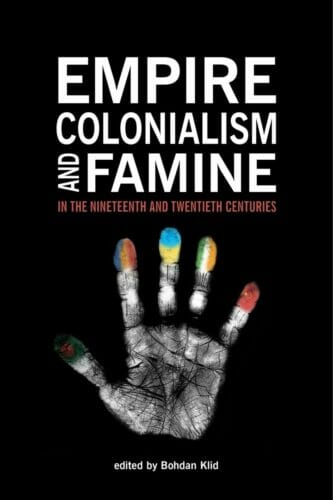
Empire, Colonialism, and Famine in the Nineteenth and Twentieth Centuries
The essays in this volume examine the often-overlooked connection between empire building, imperial rule, and mass starvation. While droughts and other natural disasters can lead to serious food shortages, a decline in food availability need not result in wide-scale starvation. Mass starvation in the nineteenth and twentieth centuries has almost always been linked to political decisions about food distribution—whether food is made available to those who most need it. Some of the worst cases occurred within empires or their colonies, with the greatest number of victims in the communist empires ruled by Mao, Lenin, and Stalin.
Topics addressed include famines in Soviet-ruled Ukraine, British-ruled Ireland and India, and the People’s Republic of China, as well as famine and food policies during World War II connected to Nazi German and Romanian empire-building in occupied Ukraine and Moldova. One essay compares the Irish and Ukrainian famines in the context of internal colonialism and alien rule. Another examines Raphael Lemkin’s views on genocide and famine. The introductory essay provides an overview of recent literature on famine theory and other studies addressing the connection between empires, empirebuilding, and famines. The collection points to the value of comparative study of wartime famines in occupied territories in the context of empire building, and of famines linked to imperial or colonial rule in overseas colonies or peripheral regions (internal colonies). This volume had its origins in conferences organized in 2016 in Toronto and 2017 in Kyiv by the Holodomor Research and Education Consortium (HREC). HREC is a project of the Canadian Institute of Ukrainian Studies, University of Alberta, established through funding from the Temerty Foundation.
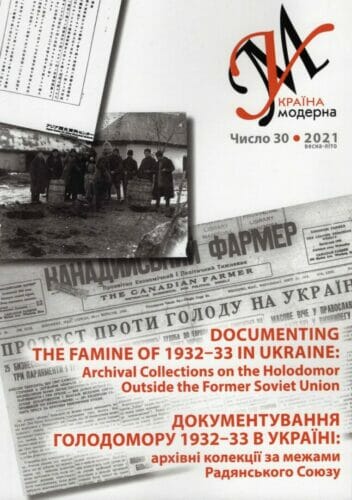
Україна Модерна, No. 30, 2021
Supported by the Peter Jacyk Program for the Study of Modern Ukrainian History and Society at the Canadian Institute of Ukrainian Studies, the scholarly journal Ukraina Moderna is one of the leading historical journals in Ukraine.
Its special issue no. 30 for 2021 is dedicated to the topic of the archival collections on the Holodomor outside the former Soviet Union. It contains fifteen scholarly articles that resulted from a conference entitled “Documenting the Famine of 1932–33 in Ukraine: Archival Collections on the Holodomor Outside the Former Soviet Union,” which was held at the University of Alberta on 1–2 November 2019. The conference organizers, seeking to explore and bring to light little-known sources, invited a number of scholars who have worked in archival collections to contribute to the discussion. The resulting volume presents a survey of various archival collections. Researchers who have worked with archives of immigrant and diaspora communities in Europe and North America shared their knowledge of materials in the collections of Ukrainian, Jewish, and Mennonite communities that had emigrated from Soviet Ukraine. The archives of these groups, which had maintained contact with and aided their compatriots in Soviet Ukraine, cast a new light on the events of 1932–33. A number of papers in this volume describe these archival collections and analyze materials of these lesser-known and under-researched primary sources. This issue also contains nine book reviews.
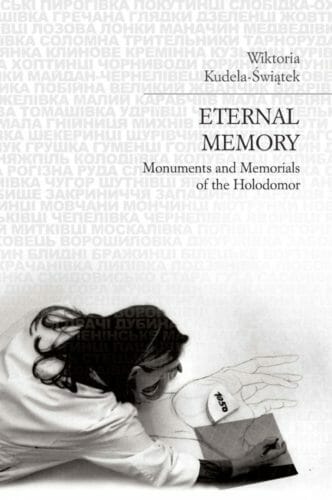
Eternal Memory: Monuments and Memorials of the Holodomor
In Eternal Memory: Monuments and Memorials of the Holodomor, Wiktoria Kudela-Świątek provides an in-depth examination of “places of memory” associated with the Great Famine of 1932–33 in Ukraine, supplemented by photographs from across the globe that highlight both the uniqueness of individual monuments and their commonalities. The author investigates the history, aesthetics, and symbolism of a wide array of commemorative spaces, including museums, commemorative plaques, and sites directly linked with the victims of the Holodomor (previously unmarked mass graves, for example). The book not only illuminates the range of meanings that communities of memory have invested in these sites but sheds light on the processes by which commemorative practices have evolved and been shared between Ukraine and the diaspora.
Kudela-Świątek, Wiktoria. Eternal Memory: Monuments and Memorials of the Holodomor. Edmonton: University of Alberta Press, 2022
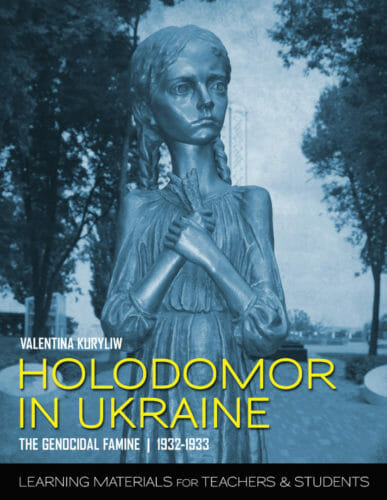
Holodomor in Ukraine, the Genocidal Famine 1932-1933: Learning Materials for Teachers and Students
A new comprehensive teaching resource authored by Valentina Kuryliw, Director of Education for the Holodomor Research and Education Consortium, entitled Holodomor in Ukraine, the Genocidal Famine 1932-1933: Learning Materials for Teachers and Students is now available for educators and the general public. Targeted at educators teaching students in primary and secondary schools, it features stand-alone teaching materials, lesson plans and assignments with straightforward, sensible and basic information about the Famine. As one of the genocides recognized by the Canadian government, it was covered up, denied and ignored for over five decades. The long-awaited resources it offers are prime new learning materials for students.
Printed in full colour, the richly illustrated book contains archival documents excerpted and translated for ease of use, timelines, maps, memoirs, photographs, eyewitness accounts, age-appropriate literary works, multimedia links and resource listings. Text-dependent questions are provided for each resource. The book is accessible, instantly useable and packed with ideas and photocopiable resources.
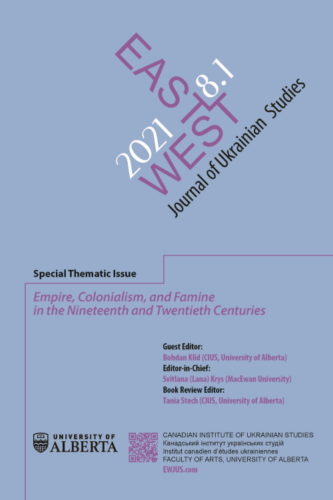
Special thematic issue “Empire, Colonialism, and Famine in the Nineteenth and Twentieth Centuries,” East/West Journal of Ukrainian Studies
Vol 8, no 1 (Spring 2021) of East/West: Journal of Ukrainian Studies (EWJUS) is a special thematic issue, titled “Empire, Colonialism, and Famine in the Nineteenth and Twentieth Centuries.”
EWJUS is an open access, peer-reviewed, academic journal launched by the Canadian Institute of Ukrainian Studies at the University of Alberta in 2014.
In the words of guest editor Bohdan Klid of HREC/CIUS, "This volume consists of essays that examine the connection between empire building, imperial rule and famine. Contributions include papers on famine and food policies during World War II connected to empire-building in occupied Ukraine and Moldova, as well as on famines in Soviet Ukraine, British-ruled Ireland and India, and Mao’s China. One essay compares the Irish and Ukrainian famines in the context of internal colonialism and alien rule. Another examines Raphael Lemkin’s views on genocide and famine. An introductory essay looks at recent literature on famine theory and on empires and famine, and reflects on the articles contained in the volume. The collection demonstrates that famines that have occurred during wartime in occupied territories and in overseas colonies or peripheral regions (internal colonies) of empires can be fruitfully studied within the context of empire building, imperial policies, and colonial rule. The volume grew from the proceedings of conferences held in Toronto (2016) and Kyiv (2017) organized by the Holodomor Research and Education Consortium (HREC). HREC is a project of the Canadian Institute of Ukrainian Studies, University of Alberta, established through funding from the Temerty Foundation."
The issue also features an array of reviews, two review articles of recent titles in Ukrainian studies, and an obituary for Bohdan Medwidsky, the founder of the Kule Folklore Centre and the Bohdan Medwidsky Ukrainian Folklore Archives at the University of Alberta.
Since EWJUS is an open access journal, all visitors to the site have immediate, free access. Readers are also welcome to register with EWJUS on the site in order to receive future updates.
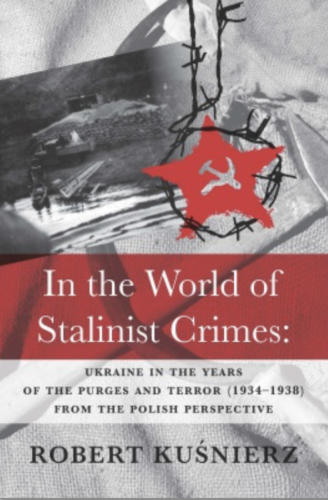
In the World of Stalinist Crimes: Ukraine in the Years of the Purges and Terror (1934‒1938) from the Polish Perspective
Robert Kuśnierz. In the World of Stalinist Crimes: Ukraine in the Years of the Purges and Terror (1934‒1938) from the Polish Perspective. Edmonton; Toronto: CIUS, 2020
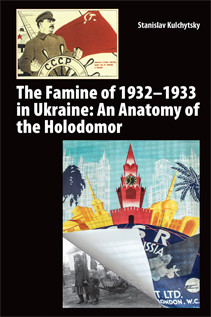
The Famine of 1932–1933 in Ukraine: An Anatomy of the Holodomor
The Famine of 1932–1933 in Ukraine: An Anatomy of the Holodomor is a distillation of thirty years of study of the topic by one of Ukraine’s leading historians. In this account, Stanislav Kulchytsky ably incorporates a vast array of sources and literature that have become available 0in the past three decades into a highly readable narrative, explaining the motives, circumstances and course of this terrible crime against humanity.
Stanislav Kulchytsky. The Famine of 1932–1933 in Ukraine: An Anatomy of the Holodomor. Edmonton; Toronto: CIUS, 2018.
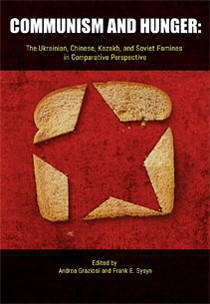
Communism and Hunger: The Ukrainian, Chinese, Kazakh, and Soviet Famines in Comparative Perspective
In this volume, leading specialists examine the affinities and differences between the pan-Soviet famine of 1931–1933, the Ukrainian Holodomor, the Kazakh great hunger, and the famine in China in 1959–1961. The contributors presented papers at a conference organized by the Holodomor Research and Education Consortium in 2014.
Andrea Graziosi and Frank Sysyn. Communism and Hunger: The Ukrainian, Chinese, Kazakh, and Soviet Famines in Comparative Perspective. Toronto: CIUS Press, 2016.
- Andrea Graziosi and Frank E. Sysyn, "Communism and Hunger: Introduction."
- Nicolas Werth, "Stalin’s and Mao’s Famines: Similarities and Differences Food Shortages, Hunger, and Famines in the USSR, 1928-33."
- Lucien Bianco, “Comparing the Soviet and Chinese Famines: Their Perpetrators, Actors, and Victims."
- Niccolò Pianciola, "Towards a Transnational History of Great Leaps Forward in Pastoral Central Eurasia."
- Sarah Cameron, "The Kazakh Famine of 1930-33: Current Research and New Directions."
- Zhou Xun, "Re-examining the History of the Great Famine in China through Documentary Evidence."
- Andrea Graziosi, "Selected Bibliography of Socialist Famines in the Twentieth Century"
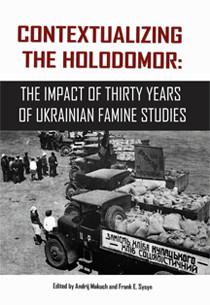
Contextualizing the Holodomor: The Impact of Thirty Years of Ukrainian Famine Studies
It was in the 1980s that the Famine of 1932–33 in Ukraine became the subject of serious academic study with the publication of Robert Conquest’s ground-breaking The Harvest of Sorrow. In 2013, on the 80th anniversary of the Holodomor, HREC partnered with several institutions to organize a conference examining what 30 years of scholarly work on the Famine has added to our understanding of Ukrainian history, Soviet history, communism, and genocide studies. This volume contains articles presented at a conference by the same name organized by HREC.
Andrij Makuch and Frank Sysyn. Contextualizing the Holodomor:The Impact of Thirty Years of Ukrainian Famine Studies. Toronto: CIUS Press, 2015.
- Frank Sysyn, "Thirty Years of Research on the Holodomor: A Balance Sheet."
- Olga Andriewsky, "Towards a Decentred History: The Study of the Holodomor and Ukrainian Historiography."
- Andrea Graziosi, "The Impact of Holodomor Studies on the Understanding of the USSR."
- Françoise Thom, "Reflections on Stalin and the Holodomor."
- Stanislav Kul'chyts'kyi, "The Holodomor of 1932–33: How and Why?"
- Norman M. Naimark, "How the Holodomor Can Be Integrated into our Understanding of Genocide."